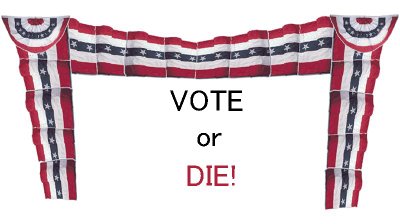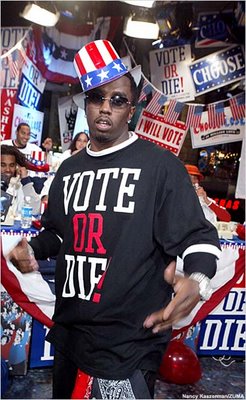
Strangely, I’m not dead.
As a dear friend and fellow patriot, R. Fitzgerald, eloquently and insightfully notes:
 I’m surprised that so many people vote on election day given that: 1) the voting population is sufficiently large as to render the probability that an individual’s vote will have a meaningful impact on the election effectively zero; and 2) the incremental value attached to the election of one candidate rather than another is open to question and probably small. However, so long as point (1) holds, it is still irrational to vote even if the outcome of the election determined whether one lives or dies, given that one’s behavior does not have a statistically significant chance of affecting the outcome.
I’m surprised that so many people vote on election day given that: 1) the voting population is sufficiently large as to render the probability that an individual’s vote will have a meaningful impact on the election effectively zero; and 2) the incremental value attached to the election of one candidate rather than another is open to question and probably small. However, so long as point (1) holds, it is still irrational to vote even if the outcome of the election determined whether one lives or dies, given that one’s behavior does not have a statistically significant chance of affecting the outcome.This is why it makes sense to participate in a vote among five people with respect to where to go dinner, and why it doesn’t make sense to vote for president in a country with hundreds of millions of eligible voters, assuming one’s objective is solely to have an impact on the outcome of the election. Which is to say that it is not irrational to vote in a situation in which point (1) holds, so long as there is another objective in mind, e.g., extracting value from the exercise of a perceived civic duty. But I would even hazard a critique of this objective on the grounds that voting, to be precise, is a right rather than a duty.
I post his thoughts here with the utmost, wholehearted approbation. We vote to make heard our voices.

In national Congressional elections, when we share an agenda with a political candidate, casting a vote in her favor is the crux of our democratic process. When you have no vested interest in either competing platform, when you are economically or emotionally indifferent to the election outcome, when you despise both alternatives on the ballot before you, there is no greater statement to make, no greater way to show your support for our system of government than simply not to vote. To abstain from a vote is not un-American. Exercising your right not to vote does not mean you are politically uninformed or lazy. Not voting means not advocating inferior personnel or bad ideas.
 Not voting shows your faith in the American system to continue despite unqualified politicians and bad policy – that the system transcends the people involved. Not voting is a tool for the disenfranchised, disillusioned, and disappointed. At sufficiently low levels of voter participation, political parties are forced to change or risk ceding power to new, better parties. Nothing would shake more greatly the foundations of our two-party system than if the Republicans/Democrats could no longer take their respective “bases” for granted.
Not voting shows your faith in the American system to continue despite unqualified politicians and bad policy – that the system transcends the people involved. Not voting is a tool for the disenfranchised, disillusioned, and disappointed. At sufficiently low levels of voter participation, political parties are forced to change or risk ceding power to new, better parties. Nothing would shake more greatly the foundations of our two-party system than if the Republicans/Democrats could no longer take their respective “bases” for granted. Certainly a tricky task, knowing when your vote will legitimately affect the election outcome is not impossible. In the most recent mid-term elections, American University's Center for the Study of the American Electorate estimates 40.4% of voting-age Americans made it to the polls. Historically, this turnout is significantly high, though not record setting. In Virginia and Ohio, turnout rates were even better, 43.7% and 44.6% respectively.
 Because this mid-term election presented an opportunity for only a few races to determine the majority rule in Congress, it is no surprise that voter turnout was higher than normal. As it turns out, Virginia’s Senator will determine the balance of power in that chamber and in a race where the outcome holds such importance, people made their voices heard. To the electorate, the Democrats and Republicans championed the critical importance these mid-term outcomes and the people who place a high value on majority control turned out in near-record numbers. For me, this confirms the intuition that if your vote really can affect noticeable change, you will cast it. However, as R. Fitzgerald would probably agree, to our lives the relevance of Congressional majority power is miniscule and relatively unimportant. Thank you to those who Rocked The Vote! To those brave souls who abstained - HOLLA! and RIP.
Because this mid-term election presented an opportunity for only a few races to determine the majority rule in Congress, it is no surprise that voter turnout was higher than normal. As it turns out, Virginia’s Senator will determine the balance of power in that chamber and in a race where the outcome holds such importance, people made their voices heard. To the electorate, the Democrats and Republicans championed the critical importance these mid-term outcomes and the people who place a high value on majority control turned out in near-record numbers. For me, this confirms the intuition that if your vote really can affect noticeable change, you will cast it. However, as R. Fitzgerald would probably agree, to our lives the relevance of Congressional majority power is miniscule and relatively unimportant. Thank you to those who Rocked The Vote! To those brave souls who abstained - HOLLA! and RIP.A contextual note: I vehemently object to the direct election of Senators. Blame for this Constitutional bastardization, the 17th Amendment, should be placed squarely with the Progressive Era and WR Hearst’s profit-motivated muckraking. The Federal Government should first and foremost afford representation to the State Governments.
3 comments:
Wow, the 17th Amendment and the demonization of cannabis? Damn you, Hearst!
One could argue, however futile it may be, that as an intelligent individual you have more of a duty to vote so as to counter act the uninformed masses who vote blindly for one party or another based on false promises and faulty generalizations. I agree that, and I believe a group of Canadians said it best, "If you choose not to decide, you still have made a choice." However a non-vote can only legitimately considered effectual in those smaller voting instances you mention earlier in your post. When voting for judges, you are asked to vote yes or no. A non-vote does nothing as this is a binary choice and a non-vote or "not caring" is a false choice. When voting in a race where there are multiple parties (read that more than two) with a legitimate chance, one can argue a non-vote is in fact a valid decision. Alas, in our ineffectual two-party-non-system we again have a binary choice. Democrat or Republican (we all know that a third party candidate almost always takes votes away primarily from one party and can be considered a synthetic vote for the other candidate). However in this country where we are all bamboozled into believing that we do in fact have two parties (when in the grand scheme of things the two party system can be regarded as a giant smoke and mirrors trick) not casting a vote is as bad as an uninformed voter following what the idiot box has told him/her to vote for. So while I can't argue the statistics about an individual vote (numbers don't lie do they?!?), I vehemently disagree with your opinion that a non-vote is as patriotic as a vote against, or a vote for.
hear, hear... 17th amendement sucks the big one.
Post a Comment